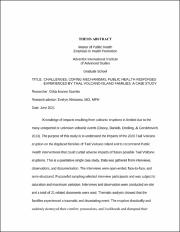Challenges, coping mechanisms, public health responses experienced by Taal volcano island families : a case study
Abstract
Knowledge of impacts resulting from volcanic eruptions is limited due to the many unreported or unknown volcanic events (Doocy, Daniels, Dooling, & Gorokhovich, 2013). The purpose of this study is to understand the impacts of the 2020 Taal Volcano eruption on the displaced families of Taal Volcano Island and to recommend Public Health interventions that could curtail adverse impacts of future possible Taal Volcano eruptions. This is a qualitative single case study. Data was gathered from interviews, observations, and documentation. The interviews were open-ended, face-to-face, and semi-structured. Purposeful sampling selected interview participants and was subject to saturation and maximum variation. Interviews and observation were conducted on-site and a total of 21 related documents were used. Thematic analysis showed that the families experienced a traumatic and devastating event. The eruption drastically and suddenly destroyed their comfort, possessions, and livelihoods and disrupted their
children’s education. While the experience was emotionally taxing, participants coped with the help of external and self-coping mechanisms. Public Health influences were lean, and recommendations for boosting community-level disaster management planning in prevention, preparedness, and response emerged.


